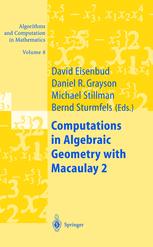

Most ebook files are in PDF format, so you can easily read them using various software such as Foxit Reader or directly on the Google Chrome browser.
Some ebook files are released by publishers in other formats such as .awz, .mobi, .epub, .fb2, etc. You may need to install specific software to read these formats on mobile/PC, such as Calibre.
Please read the tutorial at this link: https://ebookbell.com/faq
We offer FREE conversion to the popular formats you request; however, this may take some time. Therefore, right after payment, please email us, and we will try to provide the service as quickly as possible.
For some exceptional file formats or broken links (if any), please refrain from opening any disputes. Instead, email us first, and we will try to assist within a maximum of 6 hours.
EbookBell Team

4.1
70 reviewsSystems of polynomial equations arise throughout mathematics, science, and engineering. Algebraic geometry provides powerful theoretical techniques for studying the qualitative and quantitative features of their solution sets. Re cently developed algorithms have made theoretical aspects of the subject accessible to a broad range of mathematicians and scientists. The algorith mic approach to the subject has two principal aims: developing new tools for research within mathematics, and providing new tools for modeling and solv ing problems that arise in the sciences and engineering. A healthy synergy emerges, as new theorems yield new algorithms and emerging applications lead to new theoretical questions. This book presents algorithmic tools for algebraic geometry and experi mental applications of them. It also introduces a software system in which the tools have been implemented and with which the experiments can be carried out. Macaulay 2 is a computer algebra system devoted to supporting research in algebraic geometry, commutative algebra, and their applications. The reader of this book will encounter Macaulay 2 in the context of concrete applications and practical computations in algebraic geometry. The expositions of the algorithmic tools presented here are designed to serve as a useful guide for those wishing to bring such tools to bear on their own problems. A wide range of mathematical scientists should find these expositions valuable. This includes both the users of other programs similar to Macaulay 2 (for example, Singular and CoCoA) and those who are not interested in explicit machine computations at all.